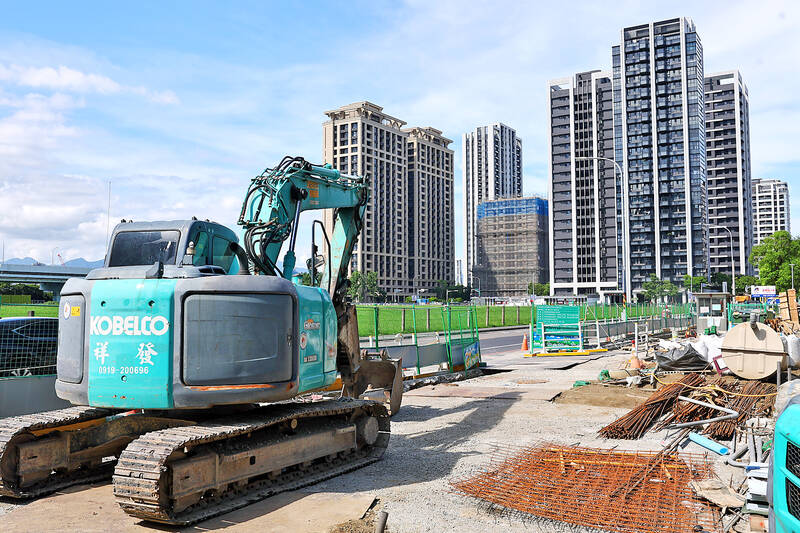The Cabinet yesterday gave the go-ahead to measures to restrict favorable lending terms for first-home purchases to once per person and require borrowers to sign an affidavit stating the house is intended for self-occupancy.
The tightened requirements came amid rising concerns over dummy buyers and misuse of loans, as mortgage operations have soared to new highs and home prices have increased by double-digit percentage points across Taiwan.
“The restrictions will go into practice immediately,” Deputy Minister of Finance Frank Juan (阮清華) told a media briefing in Taipei, adding that state-run lenders would closely review loan applicants to root out dummy buyers and property investment.

Photo: CNA
Surveys have showed that favorable lending terms introduced in August last year have revived a property boom, as they allow first-home buyers an interest rate of 1.775 percent, a five-year grace period and mortgages of up to 40 years.
Investors and wealthy people have allegedly used dummy buyers, including their children, to take advantage of the program designed to help people with real demand to buy a home, Juan said.
State-run lenders would tighten reviews of loan applications from the same household and ask borrowers to pledge that they would not lease the house, which would be against the self-occupancy requirement, he said.
People found to have contravened the rules would have their interest subsidy revoked and must return the difference, he said.
Furthermore, favorable lending terms are limited to once per person, meaning that those who sell a home purchased under the program would not qualify to apply again, Juan said.
As of May 31, the program had aided 57,980 house purchases, with combined mortgages totaling NT$428.1 billion (US$13.16 billion), the ministry said.
Houses valued at under NT$15 million accounted for 78.2 percent of the deals, while 72.99 percent of the people who took out the mortgages were 40 or younger, implying that the program effectively benefitted target buyers and should not be held responsible for rising house prices, Juan said.
Mortgages of 31 to 40 years constituted 50.01 percent of homes bought under the program, while floor areas of 16 ping to 45 ping (48.9m2 to 148.8m2) accounted for 67.76 percent of the homes, he said.
The interest subsidy had cost the state coffers NT$1.78 billion and the government would set aside more money to sustain the program until it expires in 2026, Juan said.
State-run lenders have identified suspect cases and would crack down on abuse of the program, he added.
Real-estate brokers said that the three-year interest subsidy and five-year grace period provide sufficient room for profit-taking for people who cannot afford mortgages.

AIR SUPPORT: The Ministry of National Defense thanked the US for the delivery, adding that it was an indicator of the White House’s commitment to the Taiwan Relations Act Deputy Minister of National Defense Po Horng-huei (柏鴻輝) and Representative to the US Alexander Yui on Friday attended a delivery ceremony for the first of Taiwan’s long-awaited 66 F-16C/D Block 70 jets at a Lockheed Martin Corp factory in Greenville, South Carolina. “We are so proud to be the global home of the F-16 and to support Taiwan’s air defense capabilities,” US Representative William Timmons wrote on X, alongside a photograph of Taiwanese and US officials at the event. The F-16C/D Block 70 jets Taiwan ordered have the same capabilities as aircraft that had been upgraded to F-16Vs. The batch of Lockheed Martin

GRIDLOCK: The National Fire Agency’s Special Search and Rescue team is on standby to travel to the countries to help out with the rescue effort A powerful earthquake rocked Myanmar and neighboring Thailand yesterday, killing at least three people in Bangkok and burying dozens when a high-rise building under construction collapsed. Footage shared on social media from Myanmar’s second-largest city showed widespread destruction, raising fears that many were trapped under the rubble or killed. The magnitude 7.7 earthquake, with an epicenter near Mandalay in Myanmar, struck at midday and was followed by a strong magnitude 6.4 aftershock. The extent of death, injury and destruction — especially in Myanmar, which is embroiled in a civil war and where information is tightly controlled at the best of times —

China's military today said it began joint army, navy and rocket force exercises around Taiwan to "serve as a stern warning and powerful deterrent against Taiwanese independence," calling President William Lai (賴清德) a "parasite." The exercises come after Lai called Beijing a "foreign hostile force" last month. More than 10 Chinese military ships approached close to Taiwan's 24 nautical mile (44.4km) contiguous zone this morning and Taiwan sent its own warships to respond, two senior Taiwanese officials said. Taiwan has not yet detected any live fire by the Chinese military so far, one of the officials said. The drills took place after US Secretary

THUGGISH BEHAVIOR: Encouraging people to report independence supporters is another intimidation tactic that threatens cross-strait peace, the state department said China setting up an online system for reporting “Taiwanese independence” advocates is an “irresponsible and reprehensible” act, a US government spokesperson said on Friday. “China’s call for private individuals to report on alleged ‘persecution or suppression’ by supposed ‘Taiwan independence henchmen and accomplices’ is irresponsible and reprehensible,” an unnamed US Department of State spokesperson told the Central News Agency in an e-mail. The move is part of Beijing’s “intimidation campaign” against Taiwan and its supporters, and is “threatening free speech around the world, destabilizing the Indo-Pacific region, and deliberately eroding the cross-strait status quo,” the spokesperson said. The Chinese Communist Party’s “threats